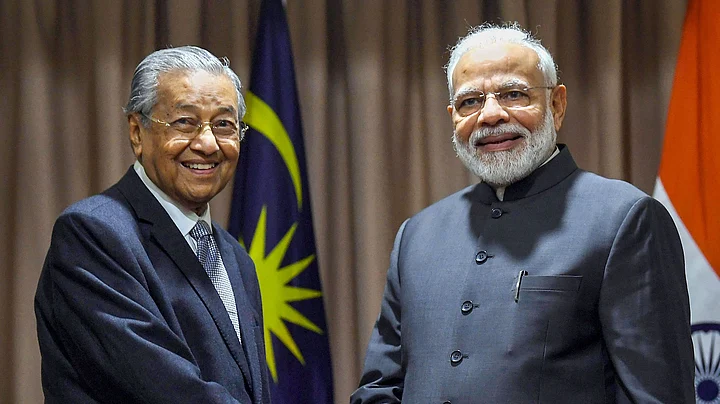Prime Minister Narendra Modi on Thursday, 5 September, explained to his Malaysian counterpart Mahathir Mohamad the rationale behind New Delhi's decision on Jammu and Kashmir and sought the extradition of controversial Indian televangelist Zakir Naik, who is wanted in India for fuelling terrorism.
Prime Minister Modi met the Malaysian prime minister on the sidelines of the fifth meeting of the Eastern Economic Forum (EEF) held in Vladivostok in the Russian Far East Region.
“Prime Minister Modi raised the issue of Zakir Naik’s extradition. Both the parties have decided that our officials will stay in contact regarding the matter and it is an important issue for us.”Foreign Secretary Vijay Gokhale
Naik, a 53-year-old radical television preacher, reportedly left India in 2016 and subsequently moved to majority-Muslim Malaysia, where he was granted permanent residency.
He has been banned from from any public activities in the multi-ethnic country after his remarks against Malaysian Hindus and Chinese on 8 August.
Modi Gives Mahathir the Logic Behind Article 370 Abrogation
Prime Minister Modi also discussed with Mahathir the "reorganisation" and the developments related to Jammu and Kashmir. The growing threat of terrorism also figured in their talks.
"PM Modi explained to Mahathir the rationale behind the reorganisation of the state of Jammu and Kashmir, in terms of both giving effective governance and delivering socio-economic justice. And in that context, the focus was on terrorism, on how to combat the growing threat of terrorism," Gokhale said.
"PM Mahathir acknowledged that terrorism was a global problem and Malaysia is against any form terrorism," he added.
India revoked Jammu and Kashmir's special status on 5 August and has categorically told the international community that the scrapping of Article 370 was an internal matter and also advised Pakistan to accept this reality. Pakistan is trying to internationalise the Kashmir issue after India's decision on 5 August.
Hours after India's move, Prime Minister Imran Khan held phone conversation with Mahathir and sought support on the issue.
Prime Minister Mahathir expressed hope that India and Pakistan would exercise "utmost restraint" to prevent further escalation that could be detrimental to peace and stability in Jammu and Kashmir.
This is the second meeting between the two leaders, the first was in May 2018 when Prime Minister Modi called on 94-year-old Mahathir in Putrajaya.
Gokhale said that the meeting between the two prime ministers was "very warm".
"Modi also described Mahathir's election as a historic one and said India was looking forward to working with Malaysia," Gokhale added.
Modi and Mahathir Discuss Trade
There was also discussion on trade and ways to diversify the bilateral ties to benefit people in both the countries.
"Mahathir acknowledged that there was a growing trade between the two countries, but that Malaysia had a surplus in trade. He assured Modi that while we should grow this trade, Malaysia is looking at ways by which we can balance this trade. He (Mahathir) said, Malaysia would consider importing more from India so that India's exports to Malaysia grow," he said.
"Meetings continue in Vladivostok. Prime Ministers @chedetofficial and Narendra Modi discuss ways to diversify India-Malaysia cooperation for the benefit of people in both countries. Strengthening ties with an important ASEAN partner," the Prime Minister's Office said in a tweet.
Modi arrived in Russia on Wednesday to participate in the 20th India-Russia annual summit and the EEF. On his arrival, Modi received a guard of honour at Vladivostok International Airport.
The forum focuses on development of business and investment opportunities in the Russian Far East Region, and presents enormous potential for developing close and mutually beneficial cooperation between India and Russia in the region.
The EEF is being held in Russia's Far East port city of Vladivostok on 4-6 September.
(At The Quint, we question everything. Play an active role in shaping our journalism by becoming a member today.)
